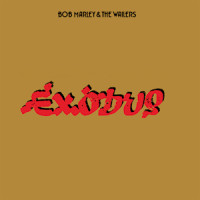
Bob Marley and The Wailers
Exodus (1977)
Jon
Exodus was Bob Marley & The Wailers ninth album, but it was the album that brought him to international attention. There are a couple notable things that are worth mentioning about this record. For one, it was the second album to feature The Wailers’ replacement backing band. In 1976, an assassination attempt had Marley exiled from Jamaica to London, where the album was recorded. Exodus features more songs on Marley’s retrospective Legend than any of his other records. The album found the group moving away from their usual way of storytelling and divided the record's theme into two halves: religious politics and sex and keeping the faith. Exodus does a great job of transcending Marley into what he is known for today.
Marley’s message often gets misconstrued. It’s fairly easy to say you like Bob Marley & The Wailers without thinking about the deeper message. Sure, it’s easy to understand the surfaced messages, but many nowadays finding out about Marley truly don’t have an understanding of the politics that were happening in Jamaica. Marley did a great job on lyrics with Exodus as he moved his lyrical themes to something people would universally understand. The album had a lot of notable songs with bigger messages in a more simple way to understand than previous records.
“Natural Mystic” starts the record in a somber tone but had a big message in it. The song relies heavily on reggae upstrokes but features a faint lead guitar that drives the song home. The bass line of the song shows the intricacy reggae had in relying on its rhythm section to truly finish the composition. “So Much Things To Say” incorporates territory that Marley had not covered but explored on this record. The main riff relies heavily on Funk influences and was certainly an upbeat song for a reggae album. The I Threes background vocals really rounded the song out and allowed it to flourish.
The seven-minute mini-epic, “Exodus” had so much going on for a reggae song that it amazingly all comes together for a perfect composition. The combination of the keyboard and guitar created a whole new foreground for Marley’s music and had a positive vibe like the rest of the record does despite half of the record being about religion and politics. The first half of the record created a vibe that many Marley fans are used to nowadays. However, it wasn’t until around the late 70s that Marley developed this sound.
The second half of the record embodied most of the hits that Marley is known for today. “Jamming” is a traditional reggae song that Marley put a spin on with his new signature style. It’s a nice reminder of how reggae should be with a laid back tone and smooth music. “Waiting In Vain” is definitely one of the most popular Marley songs. It obviously comes down to the fact that the song derived from traditional reggae but threw in a blues/rock vibe to the song. Due to his exile from Jamaica, the song can be identified as a torrid love affair separated by countries. The song was controversial as his wife at the time, who knew of Marley’s many affairs, refused to sing the song when performed live. This would not be the only song Marley would write about his love affairs but it is indeed his most popular.
“Turn Your Lights Down Low” follows suit with the vibe that “Waiting In Vain” gives off. The song was definitely meant to be a lovemaking song and upon further inspection of the lyrics, you can tell that sex is a theme. Perhaps one of the most well-known lyrics from Exodus comes from its final two songs, “Three Little Birds” and “One Love/People Get Ready.” Both songs embodied Marley’s major themes and messages. “Three Little Birds” gives an incredibly lax vibe with its theme boasting ‘Don’t worry about a thing/cause every little thing is gonna be alright.’ After an assassination attempt, it was definitely a good message of taking things as they come and to know not to get worked up about things you can’t change. These songs definitely make up what Bob Marley is known for as we remember him today.
Bob Marley & The Wailers revolutionized reggae no matter which inception of the group you look at. While Exodus was the band’s first major international success, The Wailers had released eight previous records that all lead up to the musical styling that Exodus exuded. Every song on the record boasts a simple message and given its history, it’s interesting to know that not much affected Marley at the time from getting his message out. Exodus may go down as Bob Marley & The Wailers finest hour and for good reason. The influence of soul, funk, and blues truly incorporated more feeling than any previous reggae record. It’s interesting to hear the transition from the first Wailers record to Exodus. as most people usually listen to Legend, most truly don’t know the transgression that Bob Marley & The Wailers went through as they found their voice in reggae. Exodus is definitely a good place to start.